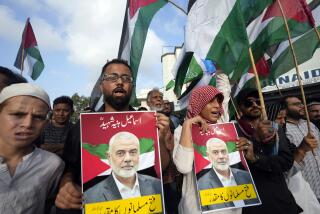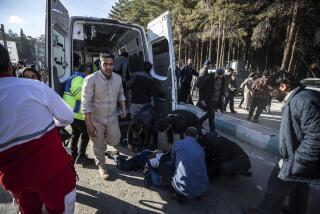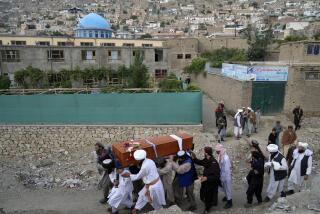A peaceful death, then the blast
- Share via
BAGHDAD — Unlike so many deaths in this city these days, the passing of Ahmed Lami was remarkable not for its violent end, but for its lack of bloodshed: He died of natural causes at 65.
But even peaceful death has become a magnet for violence. As his Shiite Muslim family and friends gathered to mourn his passing Tuesday afternoon under a tent in a middle-class, religiously mixed neighborhood on Palestine Street, a suicide bomber walked in, sat down and detonated his explosives, killing at least seven people and injuring 21.
The funeral blast was among several car bombings, shootings and explosions around Iraq on Tuesday that suggested insurgents were finding new ways to evade the ongoing security crackdown by U.S. and Iraqi forces.
At least six people were killed in what authorities described as a crude attempt to detonate a chemical weapon in Taji, about 12 miles northwest of Baghdad. Insurgents blew up a truck holding two tanks of chlorine gas, which were thrown clear of the vehicle and leaked, the U.S. military said. Scores of people suffered nausea, vomiting and irritated eyes from exposure to the gas, according to wire service reports. Prolonged exposure to high concentrations of the gas can cause deadly respiratory damage.
The U.S. military said a Marine died Tuesday during combat in Al Anbar province, in western Iraq. The death brought to 3,147 the number of U.S. military personnel killed in the Iraq theater since the March 2003 American-led invasion, according to the website icasualties.org.
At the Lami funeral, attendance was smaller than usual for such public events, because fear of death grips the capital. Lami’s family even took precautions to guard against a car bomb attack, blocking entrances to the tent with a minibus and palm trunks.
But the suicide bomber took advantage of common courtesies extended to those attending such ceremonies, where food is served and strangers are welcome to partake.
“The suicide bomber came in and greeted us and sat down,” said Lami’s cousin, Sabur Abdul-Hussein, who suffered slight shrapnel wounds in the blast. “We thought he was poor, waiting for the feast to be served. We asked each other if someone might know him.” After two minutes, Abdul-Hussein said, the stranger blew himself up.
Abdul-Hussein said his family had begun to feel safer when the new security plan was announced but now thought the city was gripped by violence that would not let go. Those killed in the funeral bombing were two of Abdul-Hussein’s brothers and five of his cousins.
“The scene was chaos -- women came out from the deceased’s house and started wailing and beating their chests,” he said. “And there were my relatives’ bodies, scattered and torn to pieces.”
In the Shiite holy city of Najaf, a bomb Monday evening caused severe damage to a provincial office of the Iraqi National Accord, the party of former interim Prime Minister Iyad Allawi, who returned to Iraq last week in a bid to unify the nation’s political factions. Allawi, a onetime protege of Western intelligence agencies, had been living in London and Amman, Jordan, after his party fared poorly in 2005 parliamentary elections.
Police also found 25 corpses dumped around Baghdad. A source in the Interior Ministry said the bodies, all with gunshot wounds, bore no markings of torture, as they often have in the past.
The U.S. military on Tuesday also updated the number of American military personnel wounded in Monday’s attack on a U.S. base in Tarmiya, about 25 miles north of Baghdad, from 17 to 29.
*
christian.berthelsen@latimes.com
Special correspondents in Baghdad, Najaf and Taji contributed to this report.
More to Read
Sign up for Essential California
The most important California stories and recommendations in your inbox every morning.
You may occasionally receive promotional content from the Los Angeles Times.













